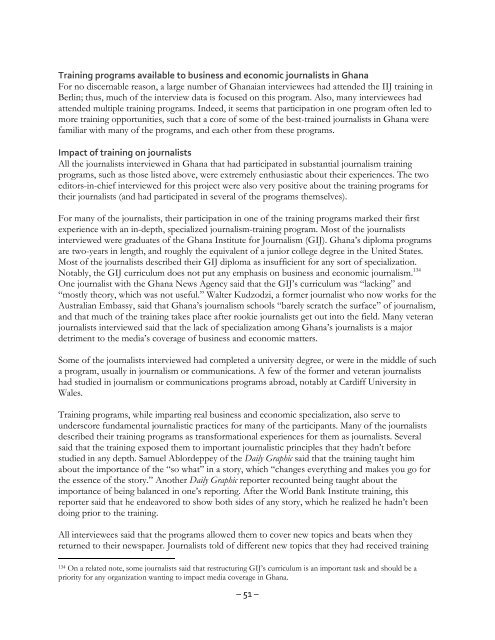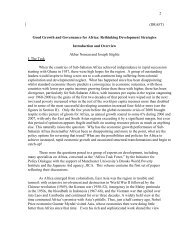Public Agenda escaped without being penalized, but not be<strong>for</strong>e expending precious time andresources to fight the litigation.Dr. Audrey Gadzekpo, director of the University of Ghana at Legon’s School of Communications,said that extractive industry journalism also suffers from a polarization in the stories that arepublished about the industry. Gadzekpo said that almost all extractive stories can be broken downinto two types: (1) press release and event stories promoted by the extractive companies, and (2)advocacy-type stories that criticize industry practices or impacts. Gadzekpo said that “not muchholistic reporting is happening,” which represents a weakness in the Ghanaian media’s coverage ofthe extractives. Numerous journalists interviewed <strong>for</strong> the project expressed similar sentiments. Manyjournalists recognized the importance of the extractive industries and wanted to produce stories thatlooked at the full impact, both positive and negative, of the extractives. However, they said thatchallenges they face make such stories exceedingly difficult to pursue.Another problem related to extractive industry coverage involves the section under which stories arereported. Rayborn Bulley, of Institute <strong>for</strong> Financial and Economic Journalists (IFEJ), said that toomany extractive industry stories end up in the environmental section of newspapers, and are nottreated as business stories in their own right, which ultimately discredits coverage of an importantaspect of the economy.Several journalists also said that a major challenge to covering the extractives was simply the lack ofinterest among the reading public and journalists themselves. Veteran journalist Francis Kokutsesaid he was surprised when he found that no one, except him, was covering the construction of theWest African Gas Pipeline, a major regional infrastructure project. He also said there was littleinterest among publishers in running with the story, simply because it wouldn’t be of interest toreaders. Readers do, however, seem to respond to positive coverage of the extractives. Manyjournalists said stories about the potential riches of the extractive industries (from the recent oildiscoveries, <strong>for</strong> instance) were well-received by Ghanaians hoping to get rich.Worryingly, news coverage of the recent oil discoveries and plans <strong>for</strong> extraction has beenunderwhelming, according to many journalists interviewed <strong>for</strong> this project. “Coverage of the oilindustry emanates almost entirely from the oil companies that publish and promote very technicalpress releases that aren’t explained,” said Rayborn Bulley of IFEJ. Another oft-heard frustrationfrom journalists is that breaking news about Ghana’s oil finds (a new discovery or development)usually originates from company press conferences or statements made in New York or London,and not from within Ghana.All in all, coverage of the extractive industries in Ghana seems woefully insufficient, given theseindustries’ impact on the national economy, particularly considering that Ghana’s nascent oilindustry is about to grow significantly. When asked what Ghana’s media should focus on, MarianAdjei of the Concorde – without prompting – said “the extractive sector.” Coverage of theseindustries, Adjei said, is “less than 10 percent of what needs to be done.”The Impact of Training ProgramsThe following section focuses on the impact that various journalism-training programs are havingon Ghanaian journalism.– 50 –
Training programs available to business and economic journalists in GhanaFor no discernable reason, a large number of Ghanaian interviewees had attended the IIJ training inBerlin; thus, much of the interview data is focused on this program. Also, many interviewees hadattended multiple training programs. Indeed, it seems that participation in one program often led tomore training opportunities, such that a core of some of the best-trained journalists in Ghana werefamiliar with many of the programs, and each other from these programs.Impact of training on journalistsAll the journalists interviewed in Ghana that had participated in substantial journalism trainingprograms, such as those listed above, were extremely enthusiastic about their experiences. The twoeditors-in-chief interviewed <strong>for</strong> this project were also very positive about the training programs <strong>for</strong>their journalists (and had participated in several of the programs themselves).For many of the journalists, their participation in one of the training programs marked their firstexperience with an in-depth, specialized journalism-training program. Most of the journalistsinterviewed were graduates of the Ghana Institute <strong>for</strong> Journalism (GIJ). Ghana’s diploma programsare two-years in length, and roughly the equivalent of a junior college degree in the United States.Most of the journalists described their GIJ diploma as insufficient <strong>for</strong> any sort of specialization.Notably, the GIJ curriculum does not put any emphasis on business and economic journalism. 134One journalist with the Ghana News Agency said that the GIJ’s curriculum was “lacking” and“mostly theory, which was not useful.” Walter Kudzodzi, a <strong>for</strong>mer journalist who now works <strong>for</strong> theAustralian Embassy, said that Ghana’s journalism schools “barely scratch the surface” of journalism,and that much of the training takes place after rookie journalists get out into the field. Many veteranjournalists interviewed said that the lack of specialization among Ghana’s journalists is a majordetriment to the media’s coverage of business and economic matters.Some of the journalists interviewed had completed a university degree, or were in the middle of sucha program, usually in journalism or communications. A few of the <strong>for</strong>mer and veteran journalistshad studied in journalism or communications programs abroad, notably at Cardiff University inWales.Training programs, while imparting real business and economic specialization, also serve tounderscore fundamental journalistic practices <strong>for</strong> many of the participants. Many of the journalistsdescribed their training programs as trans<strong>for</strong>mational experiences <strong>for</strong> them as journalists. Severalsaid that the training exposed them to important journalistic principles that they hadn’t be<strong>for</strong>estudied in any depth. Samuel Ablordeppey of the Daily Graphic said that the training taught himabout the importance of the “so what” in a story, which “changes everything and makes you go <strong>for</strong>the essence of the story.” Another Daily Graphic reporter recounted being taught about theimportance of being balanced in one’s reporting. After the World Bank Institute training, thisreporter said that he endeavored to show both sides of any story, which he realized he hadn’t beendoing prior to the training.All interviewees said that the programs allowed them to cover new topics and beats when theyreturned to their newspaper. Journalists told of different new topics that they had received training134 On a related note, some journalists said that restructuring GIJ’s curriculum is an important task and should be apriority <strong>for</strong> any organization wanting to impact media coverage in Ghana.– 51 –
- Page 1 and 2:
THEREWILLBE INKA study of journalis
- Page 3 and 4:
AcknowledgementsThis paper has bene
- Page 7 and 8: Executive SummaryPurpose of the Rep
- Page 9 and 10: journalists in these countries that
- Page 11 and 12: Existing International Training Opp
- Page 13 and 14: • Consumer Affairs and Informatio
- Page 15 and 16: Background 3Of the three countries
- Page 17 and 18: pervasive conflict in the Niger Del
- Page 19 and 20: 3) Crises or disruptions, where som
- Page 21 and 22: Low pay and low regardOne of the mo
- Page 23 and 24: Even in cases where working journal
- Page 25 and 26: But while some reporters think FOIB
- Page 27 and 28: When asked how much the media could
- Page 29 and 30: the effects of these challenges for
- Page 31 and 32: detailed analysis of the opportunit
- Page 33 and 34: journalist said he has, however,
- Page 35 and 36: completely make use of some of the
- Page 37 and 38: money. Their knowledge of what medi
- Page 39 and 40: Notes on conducting research in Nig
- Page 41 and 42: Ghana- 35 -
- Page 43 and 44: evenues each year,” 106 which wou
- Page 45 and 46: entertainment news, scandals, and p
- Page 47 and 48: The rise of business-focused journa
- Page 49 and 50: coverage of the oil industry is als
- Page 51 and 52: needed supplementary income to cash
- Page 53 and 54: as supporting one political party o
- Page 55: Numerous journalists recounted how
- Page 59 and 60: Amos Safo, editor-in-chief at the p
- Page 61 and 62: Notes on conducting research in Gha
- Page 63 and 64: Background 136Literacy and Educatio
- Page 65 and 66: “sufficient information” about
- Page 67 and 68: or criminal charges for content the
- Page 69 and 70: have such difficulty obtaining info
- Page 71 and 72: The majority of those interviewed b
- Page 73 and 74: commitment to their profession and
- Page 75 and 76: Notes on Conducting Research in Uga
- Page 77 and 78: Recommendations for Revenue Watch I
- Page 79 and 80: people who have no journalism backg
- Page 81 and 82: analyzes business,” he said, “e
- Page 83 and 84: A journalist with The Punch said,
- Page 85 and 86: The Media Foundation for West Afric
- Page 87 and 88: Length of TrainingRoughly three-qua
- Page 89 and 90: industries, for instance, ought to
- Page 91 and 92: otherwise being published in the pr
- Page 93 and 94: Non-Training Recommendations for Ug
- Page 95 and 96: Appendix A: NigeriaPotential Partne
- Page 97 and 98: journalists. Biakolo is very profes
- Page 99 and 100: Television Stations• Nigerian Tel
- Page 101 and 102: have two to four month professional
- Page 103 and 104: City: AccraTelephone: +233 (021) 22
- Page 105 and 106: Fax: +256 414 255 495E-mail: umdf@a
- Page 107 and 108:
• What do you think are the most
- Page 109 and 110:
Appendix E: Survey Questions1. Name
- Page 111 and 112:
18. How effective were the teaching
- Page 113 and 114:
28. What are the most important cha
- Page 115 and 116:
1. Journalists by Country2. How wou
- Page 117 and 118:
5. How often do you travel out of t
- Page 119 and 120:
9. Which organization(s) sponsored
- Page 121:
12. After completing the training(s














